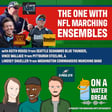
The One About Marching Band Across the Country
Join Austin along with Sean and Woody as they welcome guest clinicians from across the country to discuss what band is like across the US.
Don't miss a beat! Follow "On A Water Break" on social media to stay connected with the latest news, insights, and discussions from the marching arts community. Subscribe now and join us on this captivating journey!
Meet our Hosts
Jackie Brown - @spintronixguard
Stephen McCarrick - @stephenmccarick
Cindy Barry - @leandermomma
Nicole Younger - @o2bnpjs & @thecookoutcg
Trevor Bailey - @t_pain151
Trish O’Shea - @trishdish1002
Beth Beccone - @bether7189
Chris Rutt - @wildhornbrass1
Cynthia Bernard - @cynthiabern
Ashlee Amos - @famousamossss_
Theo Harrison - @harrisontheo07
Stephanie Click - @stephanieclick
Whitney Stone - @dancerwhit
Justin Surface - @J_dex07
Ashley Tran - @itsashleytran
Jack Goudreau - @goudreau_
Bill Woodward - @remoking100
Emily Nee - @tch.makes.art
Ricardo Robinson-Shinall - @ricardorrobinson
Austin Hall - @Austin_hall10
Jose Montes - @joeymontes57
Bobbey Biddle - @bobbeyboy107
Peyton Billhart - @peytonbrillhart
Music provided by leydamusic.com Follow him @josh.leyda
Avatars provided by @tch.makes.art
Keywords: Marching arts podcast, Marching band podcast, Color guard podcast, Percussion podcast, Marching arts education, Marching arts community, drum major, flourish, tatu
Thank you also to @guardcloset
#marchingband #colorguard #dci #podcast #onawaterbreak #wgi #drumline
Follow Us:
Facebook: https://www.facebook.com/profile.php?id=100090796340038
Tiktok:www.tiktok.com/onawaterbreak
Instagram: instagram.com/onawaterbreak
Contact Us:
Email: onawaterbreakpodcast@gmail.com
Website: www.onawaterbreak.com
Keywords:
Drum Corps International, DCI, Marching Music, Marching Arts, Drum Corps, Marching Band, Marching Percussion, Marching Guard, Marching Arts Podcast, Drum Corps Podcast, Marching Music Podcast, Marching Arts Community, Drum Corps Community, Marching Band Community, colorguard, dci, WGI
:



















